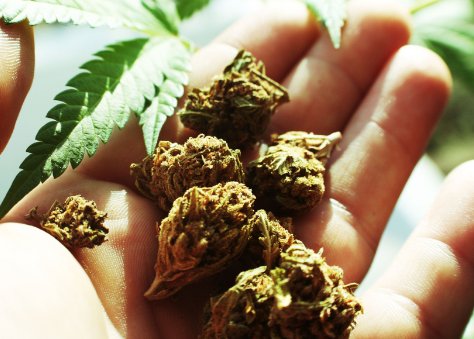Shimla: Foreigners, it seems, are cultivating a number of locals, who have brought large tracts of land under the cannabis in ‘mysterious’ valleys of Kullu, besides rugged mountains of Himalayas across Himachal Pradesh — the land of gods.
They are having a ‘field day’ in remote villages for a long time by ensuring the multimillion-dollar narcotics trade mainly high-class marijuana reaches across India and even off-shores.
The involvement of foreigners, of late largely from African countries, in the murky trade of charas or hashish that grows naturally in the wild is an open secret.
Director General of Police Sanjay Kundu said 23 foreign nationals have been arrested by the Kullu police for drug trafficking since July 2019, out of which 17 are African nationals, who were indulged in heroin peddling.
“Our focus is to break large networks of drug suppliers and studying their modus operandi rather than pursuing street-level peddlers,” Kundu told IANS.
Official sources said the African nationals arrested in Kullu district in drug trafficking cases are mainly from Nigeria, Ivory Coast, and Zambia.
Kundu said the police would also go for financial investigation and attachment of ill-gotten assets of the accused with the help of Central agencies.
As per the police, 1,538 NDPS cases were registered in the state in 2020. A total of 351.018 kg of charas, a cannabis resin, and 6.751 kg of heroin was seized and arrested 2,044 Indians and 14 foreigners.
In this year alone, a total of 149 cases under the Narcotic Drugs and Psychotropic Substances (NDPS) Act were registered with the seizure of 179.195 kg charas and 840.286 grams heroin from 189 accused till date.
In an official statement, Kundu said the biggest catch in the recent times was arrest of a 38-year-old lvory Coast national from the national capital on February 2 with the seizure of 6.297 kg of heroin and 362 grams of ganja worth Rs 25 crore.
The accused is the kingpin of heroin trade and was supplying heroin across India for many years.
A drug haul of 123 kg of charas and 295 kg of ganja, considered one of the biggest seizures of narcotics in recent years, was made on January 14 in a 20-hour-long operation in interiors of Kullu with the arrest of four people.
According to officials, over 60 per cent of the poppy and cannabis produced in Himachal is smuggled to countries such as Israel, Italy, Holland and other European countries. The rest finds its way to Nepal or other Indian states like Goa, Punjab, and Delhi.
According to police, cannabis and poppy (opium) plants are grown illegally on vast tracts in Kullu, Mandi, Shimla, and Chamba districts. Police records show that 50,000 acres in Kullu Valley alone is under cannabis cultivation.
Apart from the notorious ‘Magic Valley’ in the upper reaches of Malana, some 50 km from Kullu, easy availability of narcotics in McLeodganj and surrounding areas in Kangra district and Karsol in Kullu district has turned these areas into a haven for addicts, say police officials.
The police say ‘chitta’ — a derivative of opium and laced with synthetic drugs — is the new fad among addicts, especially the youth, in the state.
Tens of thousands of domestic and foreign tourists visit the state ever year.
The Kullu and Parvati Valleys are heavily populated by foreign tourists, largely Israelis, not all of them fascinated by the serenity of the mountains. Some never return, they either disappear or marry local women or are later found to be involved in drug trafficking in connivance with local and international drug smugglers.
Lured by cheap hashish, the police admit foreigners settled illegally in remote villages have been actively involved in smuggling narcotics. They have been indulged in providing high-yield variety cannabis seeds to local growers for planting in various high-altitude areas.
Some foreigners died of drug overdose, while others lost lives while trekking and their deaths often go unreported, admitted a senior police official.
Malana, a village in the Kullu Valley, has long been notorious for cultivating the prized ‘Malana Cream’ hashish, a purified resinous extract of cannabis.
Of late, the increasing involvement of Nepalese nationals in the narcotic trade is a matter of concern. They are procuring cheap charas from Nepal and selling it in the name of ‘Malana Cream’ in India.
“The police and central agencies are not in a position to trace such foreigners because of manpower shortage and vast areas of human settlements,” an official told IANS on condition of anonymity as he is not authorised to speak to the media.
Expressing its anguish, the Himachal Pradesh High Court has time and again been rapping state authorities on their knuckles over their response, or lack of it, to the growing drug menace.
However, state politicians see an economic boom in legalising cannabis cultivation as thousands of families depend on it. They are, however, against cannabis derivatives.
Former BJP MP and legislator Maheshwar Singh, who is the scion of the Kullu royal family, has been a strong advocate for the cannabis legalisation as he has been saying it has been grown for ages and its extract is the staple diet in every household.
Experts say there is a huge demand for opium, an extract of the poppy, in the pharmaceutical industry. Also, the climatic conditions in the state are congenial for its cultivation.
They say the selective cultivation of cannabis and poppy on the lines of Rajasthan and Madhya Pradesh could annually generate revenue of Rs 800 crore-Rs 900 crore.
Former Narcotics Control Bureau superintendent, O.P. Sharma, who is the convener-cum-advisor with the state Nasha Nivaran Board, told IANS the current trends in the state needed to be analysed as the possibility of turning opium into a heroin hub in times to come could not be ruled out.
IANS






































